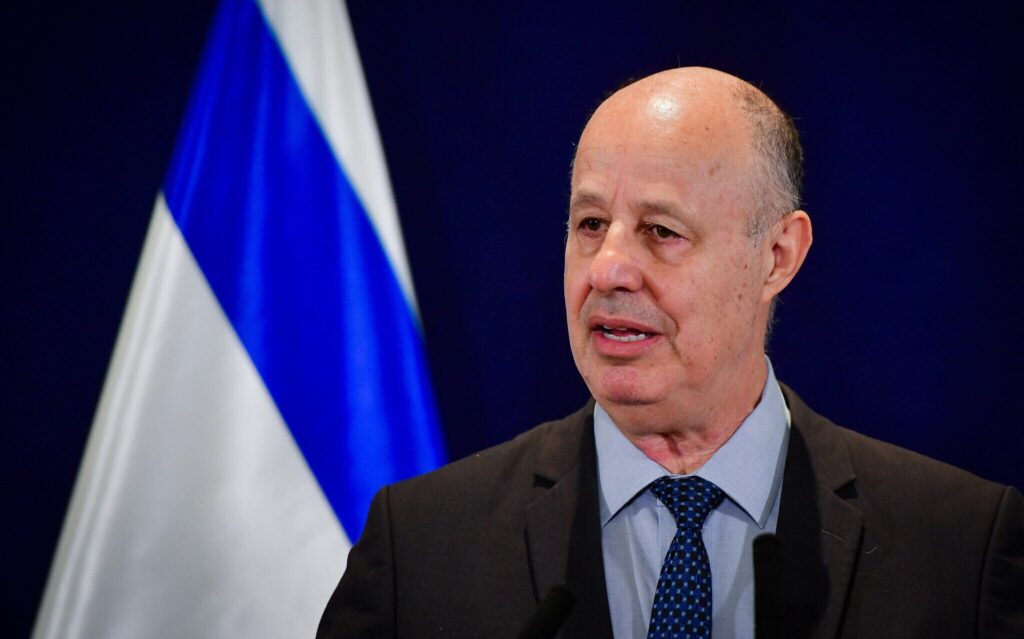NepalIsrael.com auto goggle feed
National Security Adviser Tzachi Hanegbi voiced opposition to Prime Minister Benjamin Netanyahu’s proposal to take over Gaza City on Thursday night, telling the security cabinet that he was “not prepared to give up on saving the hostages,” according to quotes reported by Channel 12 news.
“I don’t understand how someone who saw the videos of [hostages] Evyatar [David] and Rom [Braslavski] as well as all the others that were published before them can say: ‘Everything or nothing,’” he reportedly said.
There are 50 hostages left in Gaza, but only 20 of them are believed to still be alive. Multiple top security officials have reportedly warned the government the plan will risk their lives.
“The significance of this [decision] is giving up on the chance to immediately save 10 hostages,” Hanegbi said.
“A ceasefire will allow us to try and reach an agreement on the remaining 10. I agree completely with the IDF chief of staff that controlling Gaza City will endanger the lives of the hostages; therefore, I oppose the prime minister’s proposal,” the report quoted Hanegbi as adding.
He indicated he did not believe Hamas would soften its demands for a deal as a result of the Israel threats, saying “Hamas won’t adhere to this diktat.”
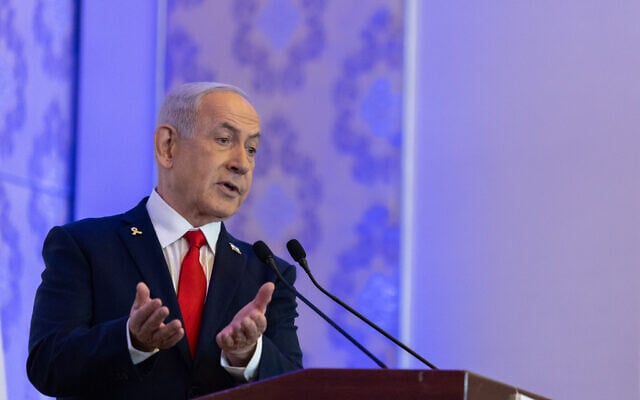
Prime Minister Benjamin Netanyahu attends a Christian Conference in Jerusalem, on April 27, 2025. (Chaim Goldberg/Flash90)
The report stated that, along with Hanegbi, IDF Chief of Staff Lt. Gen. Eyal Zamir and Mossad Chief David Barnea opposed the prime minister’s proposal.
Defense Minister Israel Katz and Strategic Affairs Minister Ron Dermer supported it Channel 12 said.
The report quoted Dermer as saying, “If we receive a [new] deal offer, we’ll consider whether to halt [the offensive].”
Far-right Finance Minister Bezalel Smotrich was quoted as responding: “If we’re not going for a full occupation and are doing it just for a deal, then it’s not worth it. If that’s the case, then the chief of staff’s plan is truly preferable.”
National Security Minister Itamar Ben Gvir, also of the far right, agreed. “We must not keep stopping halfway,” he said. “The message Hamas keeps getting is that the ball is in their court. We have to go all the way.”

National Security Minister Itamar Ben Gvir leads an Otzma Yehudit faction meeting at the Knesset, in Jerusalem, on June 30, 2025. (Chaim Goldberg/Flash90)
Zamir was said to warn: “The hostages’ lives will be in danger if we proceed with a plan to occupy Gaza. We have no way to guarantee that they won’t be harmed in such a situation. If that is what you’re aiming for, I suggest you drop the return of the hostages as one of the war’s objectives.”
Shas leader Aryeh Deri appeared to be on Zamir’s saide, saying that “Only through a deal will we free hostages” and that it would be “immoral” to fail to return them.
At one point, according to Channel 12, Attorney General Gali Baharav-Miara — who was fired by the government earlier this week but who remains in her post pending a High Court review — told the ministers that according to international law, “You can’t carry out an occupation [of Gaza] without taking responsibility” for the population.
Netanyahu reportedly shot this down. “Where did you get ‘occupation’ from? We want to control the area like we have done in other places.”
Despite the misgivings of the various officials, in the end the security cabinet approved Netanyahu’s proposal to take over the densely populated Gaza City.
The limitation of the takeover to Gaza City did not seem to go as far as what had earlier been characterized as a plan to occupy the entirety of the Strip. Netanyahu told Fox News hours before the security cabinet convened that a full takeover of Gaza was his intention.
However, the statement from Netanyahu’s office notably described the adopted proposal as one aimed at “defeating Hamas,” meaning that there may be subsequent operations beyond the one for Gaza City that were approved and not announced.
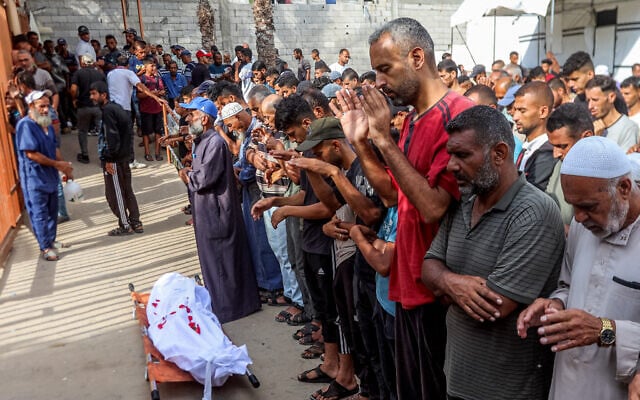
Mourners pray by the body of someone killed, following overnight Israeli bombardment, in the Mawasi area of Khan Younis in the southern Gaza Strip, on August 5, 2025. (AFP)
The decision did not use the word “occupy,” and instead referred to “taking over,” due to legal reasons pertaining to Israel’s responsibility for civilian matters in Gaza, according to the Ynet news site. The outlet added, however, citing an unnamed senior Israeli official, that this distinction was superficial, and the decision in fact related to full military rule. The conquest would stop if a hostage deal is clinched, according to the report.
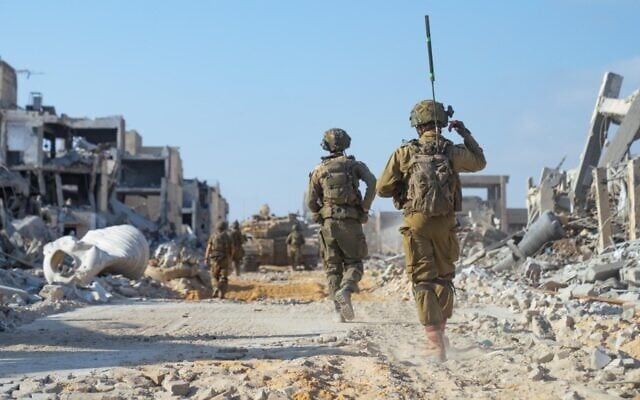
IDF troops are seen operating in the Gaza Strip in an image published by the military on August 8, 2025. (Israel Defense Forces)
The statement from Netanyahu’s office specified that Israel will provide humanitarian aid to the civilian population outside combat zones.
Roughly one million Palestinians — many of whom have already been displaced several times throughout the 22-month war — currently reside in Gaza City, in northern Gaza. A senior Israeli official told The Times of Israel that the plan approved by the cabinet will see those civilians evacuated toward the south.
The cabinet decision states that Palestinians will have until October 7, 2025, to evacuate Gaza City — a two-month window that also coincides with the second anniversary of Hamas’s attack on Israel, the Israeli official said. The IDF will then launch its ground offensive into Gaza City, placing a siege on the area in order to kill any remaining Hamas operatives. After the takeover is complete, the official indicated that the IDF will proceed to the remaining unconquered areas of Gaza.
Israel says it currently controls 75 percent of the Strip, while the IDF has largely avoided entering the remaining 25% — which mostly comprises Gaza City and refugee camps in central Gaza — due to the belief that most of the hostages are being held there. Almost all of Gaza’s 2 million citizens are currently in the quarter of the Strip that the IDF does not control. Hamas has threatened to execute hostages if its operatives detect Israeli troops closing in; Hamas captors killed six Israeli hostages in Rafah, in southern Gaza, last August, when IDF troops inadvertently neared the tunnel where they were being held.
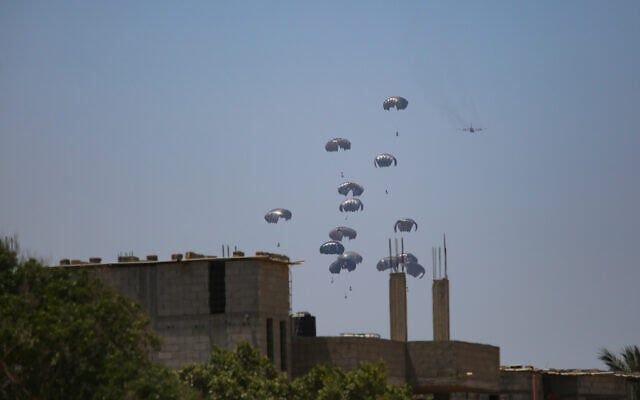
A plane airdrops humanitarian aid loaded with food supplies in the northern Gaza Strip, August 5, 2025. (Ali Hassan/Flash90)
Hostage families are vehemently opposed to the plan approved by the government, fearing it will lead to their loved ones’ demise, and staged a fiery protest in Tel Aviv on Thursday night. They were joined by thousands of supporters who blocked roads and clashed with police who tried to clear them.
They argue that the last five months have proven that military pressure has not led Hamas to release the hostages and that Israel is in a position to agree to Hamas’s demand to end the war, as the terror group no longer poses a strategic threat to the Jewish state as it did on October 7, 2023.
Netanyahu argues that ending the war and withdrawing from Gaza, as Hamas demands, will allow Hamas to regroup.
He is also reliant on far-right coalition partners who want to permanently occupy the Strip in order to push Palestinians out of the enclave and re-establish settlements in their place.
The post”PM’s national security adviser opposed Gaza City takeover plan — report” is auto generated by Nepalisrael.com’s Auto feed for the information purpose. [/gpt3]



